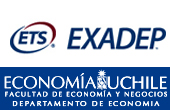Seminarios
Álvaro Aguirre (Banco Central de Chile)
Presenta: Alvaro Aguirre (Ph.D. in Economics, University of Pennsylvania; Economista Senior, Departamento de Investigación Económica, Gerencia de Estudios Económica, División de Política Económica, Banco Central de Chile).
Abstract: The possibility of firms to accumulate wealth and built collateral after positive productivity shocks is key to overcome financial frictions. However, the strength of this self-financing channel depends on the productivity process and how wealth accumulation responds to productivity shocks. In this paper we propose a framework to jointly estimate the productivity process and the wealth dynamic decision of firms that face financial constraints. We show that standard approaches for estimating productivity (e.g. Olley-Pakes) underestimate the marginal effect of capital, the persistence and the dispersion of the productivity distribution. When applying our estimator to the population of Chilean firms we show that the estimated marginal effect of capital in the production function increases from 0.35 when we do not control for financial frictions to 0.43 when we do so. We also find a significantly larger dispersion and persistence of the productivity distribution, when comparing to the estimator without financial frictions. We estimate a firm-specific process of wealth accumulation that is a function of the unobservable productivity shocks, and the collateral constraint and explore the implications of these estimations to the quantitative models exploring the effects of financial frictions on the economy.
Datos del Seminario
01 de Diciembre, 2020 | 14:00 hrs.
Fecha de término
01 de Diciembre, 2020 | 15:00 hrs.


